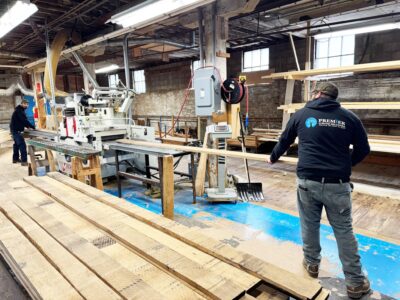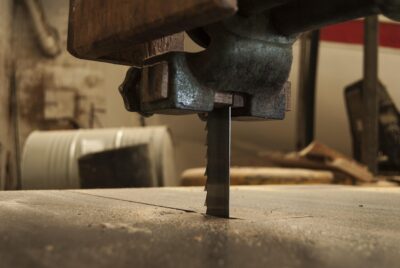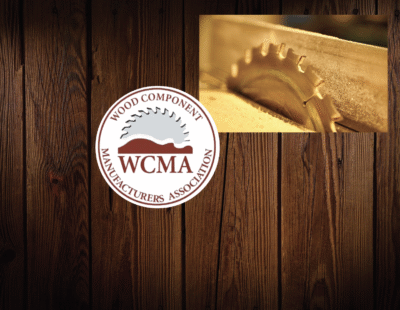
Editors Note: Betsy Natz, CEO of KCMA, provided this guest article following her webinar presentation, which was hosted by the National Hardwood Lumber Association
The National Hardwood Lumber Association (NHLA) recently hosted and presented a webinar in conjunction with the Kitchen Cabinet Manufacturers Association (KCMA).
The KCMA was founded in 1955 and represents 300 companies, comprised of cabinet manufacturers and suppliers to the industry. KCMA has a variety of program offerings that help provide their members with the knowledge and tools to grow the industry and their businesses.
The KCMA is also instrumental in monitoring issues that impact their membership. For example, in March 2019, the KCMA filed petitions with the International Trade Commission (ITC) and the Department of Commerce. The cases were filed by the American Kitchen Cabinet Alliance (AKCA), a subset of KCMA members that are U.S. domestic producers of cabinets and vanities that supported filing the cases. “We filed these cases against Wooden Cabinets & Vanities and Component parts thereof from China based on research that showed unfairly traded imports from China were devastating the domestic industry,” said Betsy Natz, CEO of KCMA.
“After much research we decided that the trade remedy law that was best for the situation and with the most long-lasting impact was the Antidumping and Countervailing Duties (AD/CVD) law,” said Natz. “We noticed that imports from China were surging into the U.S. market and causing injury to the domestic industry.”
The AKCA filed their petition on March 6, 2019. Under U.S. trade remedy laws, the ITC administer 13 months to complete its investigation and render a decision on whether the domestic industry had in fact been threatened of material injury or had been materially injured. “In March of 2020 the ITC, in a vote of five to zero, found that the domestic industry had been materially injured. The Commission determined that during the period of investigation, from 2016 to 2018, Chinese imports of wooden cabinets, vanities and component parts had increased 54 percent. They further determined that Chinese imports of this in scope merchandise took market share away from the domestic industry through persistent underselling of domestic products,” Natz said.
The Department of Commerce evaluated whether Chinese producers were dumping merchandise in the United States at less than fair or normal value and whether the Chinese producers were receiving countervailable subsidies from the Government of China. “In March of 2020 the U.S. Department of Commerce applied the following combined AD/CVD rates to these Chinese importers: The Ancientree Cabinet Co. received approximately 18 percent; Dalian Meisen Woodworking Co. approximately 280 percent; Foremost Company received approximately 130 percent; Separate Rate Companies (companies that cooperated but weren’t individually examined) received the average between Ancientree and Foremost, at about 68 percent and the China-wide Entity (those companies that are owned by The People’s Republic of China) received approximately 282 percent. In addition, the two companies Henan and Deway were given a combined rate of 293 percent.
In addition, in September 2018, President Trump’s 301 tariffs were placed on thousands of products being imported into the U.S. from China, including wooden cabinets, vanities, and components thereof. Before the AKCA filed the cases, China was importing about US$1.6 billion in just cabinets. It was estimated that if you included vanities and component parts that number was more like US$4 billion.
Over the past three years since the orders were put in place, Chinese imports of cabinets and component parts have declined to less than $15M per year. This was a major victory for the domestic cabinet industry. However, since April of 2020 we have seen imports from the Rest of the World (ROW) spike significantly, especially from other Southeast Asian countries such as Malaysia and Vietnam.
With billions of dollars at stake, Chinese producers and U.S. importers are doing everything they can to eliminate or roll back the AD/CVD determinations. These include appeals to the Court of International Trade on the original AD/CVD determinations. We have worked closely with the Commerce Department and have seen a great deal of success with these appeals.
Chinese producers have also filed for a new shipper review, and scope rulings to decrease the AD/CVD rates and narrow the scope of the relief. In a new shipper review, the Chinese exporter will petition the DOC requesting that their company be individually examined and receive a low AD rate since they were not shipping in scope product into the U.S. during the Period of Investigation. AKCA fought this allegation and prevailed.
On several occasions, companies have filed a petition to the DOC for a scope ruling review. They are essentially arguing that the product that they want to ship into the U.S. does not fall within the scope of the AD/CVD orders. Currently, one company is suggesting that their product, made from Phragmites boards (a type of MDF or particle board made from a reed substrate) should not be considered in-scope merchandise and therefore should not be subject to the duties. KCMA is demonstrating to the Commerce Department that these Phragmite cabinets are covered by the scope.
The AD/CVD statute requires that on the anniversary of the orders being put in place the Department of Commerce must initiate a review if one or more interested parties request a review. This can be either a domestic producer, a foreign producer, or an importer. The annual review is done each year leading up to the fifth year at which time the Department of Commerce initiates a five-year Sunset Review. The Sunset Review is a long and arduous process where the ITC determines whether the AD/CVD orders should be revoked or continued because their revocation would lead to recurrence of injury to the domestic industry.
Commerce began their First Annual review in April of 2021, collecting data from each company that requested a review. KCMA provided extensive factual information and comments to the agency as well. Commerce selected Qufu Xinyu and Shanghai Beautystar as the two mandatory respondents to examine individually, opting to base the dumping margins for the 15 non-selected Chinese producers on the dumping rates calculated for Qufu Xinyu and Shanghai Beautystar. On the dumping margins, the DOC assigned Qufu Xinyu a rate of 0 percent and Shanghai Beautystar a rate of 251 percent. However, the DOC then assigned the 15 non-selected companies a rate of 0 percent. The AKCA argued to Commerce that instead of giving a zero rate on the dumping margins to these 15 companies, it should have assigned the average of both Qufu Xinyu’s and Shanghai Beautystar’s rates – i.e., 125 percent. In the end, “Commerce issued its final ruling in November 2022 with very disappointing results for the domestic industry,” said Natz. Despite this outcome, the subsidies margins stayed about the same, and with President Trump’s 301’s we have not seen a surge in imports from China. “We will continue to defend the domestic industry in these annual reviews. The second review started in April of 2022 with the preliminary results of the review being announced in May 2023. Commerce calculated new rates ranging between roughly 8 percent and 43 percent. We are hopeful that the dumping margins will remain much higher in this second review when the final results are released,” Natz added.
“We have also worked closely with Customs and Border Protection (CBP), which is the agency that enforces the orders. When we have solid evidence of evasion taking place, we have two legal remedies that we have utilized: e-allegations and Enforce and Protect Act (EAPA). We have won several, lost one and then two were later revered by the Office of Rules and Regulations at CBP. KCMA has filed 10 EAPA’s and 11 e-allegations.”
The last topic Natz discussed was related to the country-wide scope/circumvention inquiries.
It was on April 22, 2022, that the AKCA/KCMA filed requests to the DOC that they initiate scope and circumvention inquiries and determine that certain imports of wooden cabinets and vanities and component parts thereof (WCV) imported from Malaysia and Vietnam are covered by the AD/CVD orders.
The filing targeted imports of WCV that originate from China and are transshipped through Malaysia or Vietnam, including imports of WCV comprised of a mix of finished and unfinished components and parts that originate from China and components that originate from Malaysia or Vietnam. We are asking that Commerce apply the final decisions in these inquiries to all imports of Chinese-origin WCV from Malaysia and Vietnam unless the importer and their Malaysian and Vietnamese suppliers can certify that the imported merchandise does not contain components that originate in China.
We expect that the DOC will issue a list of Malaysian and Vietnamese companies that are eligible to certify and a list of companies that are ineligible to participate in the process. In other words, those companies that are eligible to certify would not be required to pay duties at the border and those that are ineligible will have to do so.
In 2018, President Trump issued 301 tariffs on thousands of products coming into the U.S. from China. The tariff rate applied to cabinets and component parts was set at 25 percent. The law requires that these 301 tariffs be reviewed every four years by the United States Trade Representative. As of April 2023, the USTR is still reviewing the matter.
To summarize the issues related to Section 301 duties, Natz said:
•U.S. imports of kitchen cabinets from China under 9403.4060 of the Harmonized Tariff Schedule have been subject to 25 percent Section 301 tariffs since September 2018.
•On March 17, 2023, the U.S. Court of International Trade (CIT) issued an opinion upholding the decision to impose Section 301 tariffs on these imports from China.
•The U.S. Trade Representative is still conducting a four-year review required by the Section 301 statutes to decide whether to keep all or a portion of the Section 301 tariffs in place.
For more information visit, www.nhla.com or www.kcma.org.







